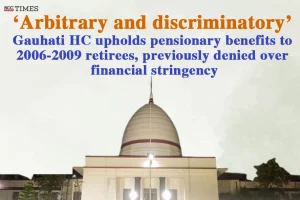Gauhati High Court: The present appeal was filed against the judgment and order dated 28-4-2016, passed by a Single Judge, whereby it was stated that persons retiring between 1-1-2006 and 31-3-2009 could not have been denied the benefit of the Assam Pay Commission recommendation of higher salary, only on the grounds of financial stringency.
The Division Bench of Ashutosh Kumar CJ and Arun Dev Choudhury J.*, stated that the classification sought to be made by the petitioners had no nexus with the object and purpose of the grant of the benefit of revised pension, as such revision was due to increase in cost of living. The Court stated that when all the pensioners formed a single class, there could not be any separate classification amongst this homogenous group. Therefore, the actions of the authorities were rightly held by the Single Judge to be unreasonable, arbitrary, discriminatory and violative of Article 14 of the Constitution. The Court thus upheld the decision of Single Judge and dismissed the appeal.
Background:
A writ petition was filed challenging the decision of the Government of Assam not to give benefits of arrears of pension/Death-Cum Retirement Gratuity etc. arising out of the recommendation of the Assam Pay Commission, 2008 to the respondents, who had retired from service between 1-1-2006 and 31-3-2009, on the grounds of financial stringency. They were instead given notional benefits, despite acceptance and implementation of the Assam Pay Commission, 2008, with effect from 1-1-2006.
The Single Judge Bench of the Court had while relying on D.S. Nakara v. Union of India, (1983) 1 SCC 305, (‘D.S. Nakara case’) stated that such classification was not permissible in the case of respondents, as they formed a class in themselves. The Single Judge had further noted that there would be no benefit of pay hike for employees who had retired prior to 1-1-2006, however, persons retiring between 1-1-2006 and 31-3-2009 could not have been denied the benefit of the Pay Commission recommendation only based on financial stringency. Aggrieved, the petitioners had filed a review petition which was dismissed on the ground that there was no error apparent on the face of the record or that something which could not be discovered without a long-drawn process of reasoning. The petitioners had thus filed the present appeal before the Court.
Case Analysis and Decision:
The Court observed that generally the State had the power to fix a cut-off date for extending pensionary benefits and financial constraint could be a valid ground for fixing a cut-off date for the grant of increased pay or other benefits. It was an equally well settled proposition of law that if the cut-off date was arbitrary, discriminatory or violative of Article 14 of the Constitution, a writ Court could strike it down.
The Court relied on D.S. Nakara case (supra), where the Supreme Court had noted that when all the retirees formed one homogenous class, the benefits must be extended equally and noted that in the present case, there was no dispute with regard to date of retirement of the respondents or date of acceptance and implementation of recommendation of the Assam Pay Commission, 2008 thus, there was no valid justification for creating two classes of respondents solely to grant a revised pension as all the respondents formed one class and were entitled to revision of their pensions in terms of the recommendation of the Assam Pay Commission, 2008.
The Court further relying on All Manipur Respondents Association v. State of Manipur, (2020) 14 SCC 625; observed that in the present case, the classification sought to be made by the State had no nexus with the object and purpose of the grant of the benefit of revised pension, as such revision was due to increase in cost of living. Further, when all the respondents formed a single class, there could not be any separate classification amongst the homogenous group. herefore, the actions of the authorities were rightly held by the Single Judge to be unreasonable, arbitrary, discriminatory and violative of Article 14 of the Constitution.
The Court thus found no reason to interfere with the impugned judgment and order dated 28-4-2016 and dismissed the appeal.
[State of Assam v. All Assam Retired Officers, Teachers and Employees Committee, 2025 SCC OnLine Gau 4051, decided on 21-8-2025]
*Order by- Justice Arun Dev Choudhary
Advocates who appeared in this case:
For the Petitioners: R. Borpujari, Advocate
For the Respondent: M. Sarma, Advocate, P. Saikia, Govt. Advocate, Assam


